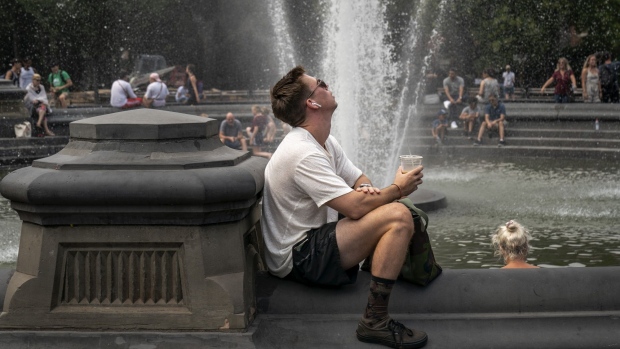Jul 19, 2019
A Week After Manhattan Went Dark, Con Edison Faces a Heat Wave
, Bloomberg News

(Bloomberg) -- Consolidated Edison Inc. has been warning for days that New Yorkers may be on the verge of some isolated power failures. An upcoming heat wave, it says, could bake the pavement and overheat power lines below.
The warnings may sound a bit odd coming from a utility that has long withstood the strain of summer weather. Widespread, heat-induced blackouts are rare in the region. This time around, though, the stakes are higher: Temperatures are rising just a week after a cascading power failure that plunged a large swath of Midtown Manhattan and the Upper West Side into darkness for hours.
Since, then ConEd has been pummeled by state and local politicians. Regulators have begun investigations. Governor Andrew Cuomo has called the blackout “unacceptable.” The New York-based utility will be spending the next few broiling days performing under a microscope.
“I want to believe that, since ConEd has a lot of capacity and they obviously prepare for this kind of scenario, that they will handle it properly,” New York City Mayor Bill de Blasio said during a press conference Wednesday. “But I still haven’t got the answers I want about what happened last Saturday.”
4,000 Strong
ConEd said it has mobilized “a force of 4,000 electric operations personnel and support staff” to respond to this weekend’s heat wave. Temperatures in New York City were forecast to hit 95 degrees Fahrenheit (35 degrees Celsius) on Friday and peak at 98 degrees Saturday and Sunday. For comparison: The hottest temperature ever recorded in Central Park was 106 degrees on July 9, 1936.
The National Weather Service has issued an excessive heat watch starting Friday afternoon.
Already, weather has knocked out some service -- just not in the widespread way that Saturday’s equipment failure took out the lights in Times Square, Madison Square Garden, Carnegie Hall and packed Broadway theaters. Storms and strong winds Wednesday and Thursday led to power disruptions in sections of Westchester County, the Bronx and Queens.
The biggest threat to the grid this weekend may be overheating equipment. Much of New York City’s system lies underground, protected from the elements by the pavement of sidewalks and streets. Most of the time, that’s a good thing, shielding wires and transformers from high winds and rain. But in high temperatures that linger for days, pavement soaks up heat and can warm the power equipment below.
“It’s not about instantaneous heat -- it’s accumulated heat,” said Javad Lavaei, an associate professor for the industrial engineering department at the University of California at Berkeley. Lavaei happened to be in New York, entering Lincoln Center, when Saturday’s blackout hit. “If you’ve got accumulated heat over four days,” he said, power equipment “may not work properly.”
Heat played an indirect role in the massive Aug. 14, 2003, blackout that darkened New York and much of the Northeast. Under the strain of strong power demand, a transmission line in Ohio sagged and brushed into nearby trees, touching off a cascade of problems that cut power to an estimated 55 million people across 8 states and one Canadian province. Stranded commuters in Manhattan spent the night sleeping on the steps of government buildings.
ConEd said that Saturday’s blackout, however, had nothing to do with hot weather. Instead, two layers of protective relays failed to isolate a short-circuiting power line as designed, leading to a series of failures that spread across city blocks. The breakdown cut power to 72,000 customers for as many as five hours, trapped people in elevators, canceled plays on Broadway and forced the evacuation of a Jennifer Lopez concert.
On the bright side: ConEd said it isn’t expecting this weekend’s heat wave to lead to a power supply shortage. Even as New Yorkers crank up their air conditioners at home, offices will mostly be closed for the weekend. “It’s not like Midtown Manhattan will be hopping on a Saturday and Sunday the way it would be on a Monday, Tuesday or Wednesday,” ConEd spokesman Bob McGee said.
--With assistance from Brian K. Sullivan.
To contact the reporter on this story: David R. Baker in San Francisco at dbaker116@bloomberg.net
To contact the editors responsible for this story: Lynn Doan at ldoan6@bloomberg.net, Aaron Clark
©2019 Bloomberg L.P.


